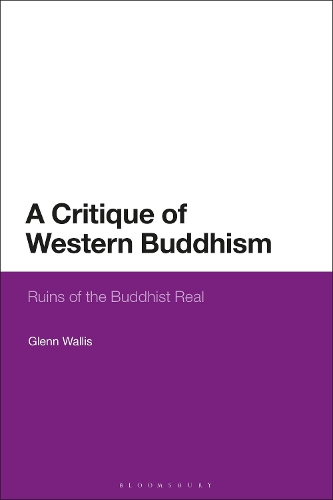
A Critique of Western Buddhism: Ruins of the Buddhist Real
(Paperback)
Available Formats
Publishing Details
A Critique of Western Buddhism: Ruins of the Buddhist Real
By (Author) Glenn Wallis
Bloomsbury Publishing PLC
Bloomsbury Academic
19th March 2020
United Kingdom
Classifications
Tertiary Education
Non Fiction
Buddhist life and practice
294.3091821
Physical Properties
Paperback
232
Width 156mm, Height 234mm
340g
Description
This book is open access and available on www.bloomsburycollections.com. It is funded by Knowledge Unlatched. What are we to make of Western Buddhism Glenn Wallis argues that in aligning their tradition with the contemporary wellness industry, Western Buddhists evade the consequences of Buddhist thought. This book shows that with concepts such as vanishing, nihility, extinction, contingency, and no-self, Buddhism, like all potent systems of thought, articulates a notion of the real. Raw, unflinching acceptance of this real is held by Buddhism to be at the very core of human awakening. Yet these preeminent human truths are universally shored up against in contemporary Buddhist practice, contravening the very heart of Buddhism. The authors critique of Western Buddhism is threefold. It is immanent, in emerging out of Buddhist thought but taking it beyond what it itself publicly concedes; negative, in employing the democratizing deconstructive methods of Franois Laruelles non-philosophy; and re-descriptive, in applying Laruelles concept of philofiction. Through applying resources of Continental philosophy to Western Buddhism, A Critique of Western Buddhism suggests a possible practice for our time, an "anthropotechnic", or religion transposed from its seductive, but misguiding, idealist haven.
Reviews
Having read through the book a second time I can say without hesitation that A Critique of Western Buddhism is one of the most important books ever written on the subject of Buddhismcertainly the most important in the decades since Buddhism has established itself as an ideological resident here in the West. * The Failed Buddhist *
The single most important book of contemporary Buddhist philosophic reflection. Wallis critique masterfully addresses the twinned questions central to contemporary Buddhism: What use is being made of Buddhism today and What use is Buddhism today * Richard K. Payne, Yehan Numata Professor of Japanese Buddhist Studies, Institute of Buddhist Studies, USA *
It is a very rare and precious thing to find a book such as this, which engages as deeply with religious materials as it does with the philosophical. Glenn Wallis brings together resources from Continental philosophy, namely Franois Laruelles non-philosophy, and concepts and ideas from Buddhism to carry out a A fecund project that grows in the ruins of our philosophical and religious pretensions and arrogance. * Anthony Paul Smith, Associate Professor of Philosophical Theology, La Salle University, USA *
Glenn Wallis' Critique of Western Budism is one of the rare examples of non-philosophy applied on a specific subject area, next to Anthony Paul Smith's non-philosophical environmental studies, John O'Maoilearca's animal studies as well non-Marxism. It proves that non-philosophy is praxis grounded rather than being self-sufficient system of philosophical diagnostics. Wallis brilliant analysis demonstrates that radicalized Buddhism establishes a perfect homology with non-philosophy, both in form and in substance. * Katerina Kolozova, Professor of Philosophy and Gender Studies, University American College, Macedonia *
Wallis' Critique is a bold commentary and analysis of Western Buddhism that runs against the mainstream. His central arguments are convincing and should certainly enter into discussions of "mindfulness" practices and adaptions of Buddhism in Western societies. This book will challenge the thinking and practice of many readers, make some uncomfortable, but will be a life preserver for others. * Stuart W Smithers, Chair of the Department of Religious Studies, University of Puget Sound, USA *
Author Bio
Glenn Wallis is an independent scholar and Director of Incite Seminars in Philadelphia, USA. He has taught at several universities, including Brown University, USA, and the University of Georgia, USA. His books include Cruel Theory/Sublime Practice: Toward a Revaluation of Buddhism (2012) and Mediating the Power of Buddhas (2001).
